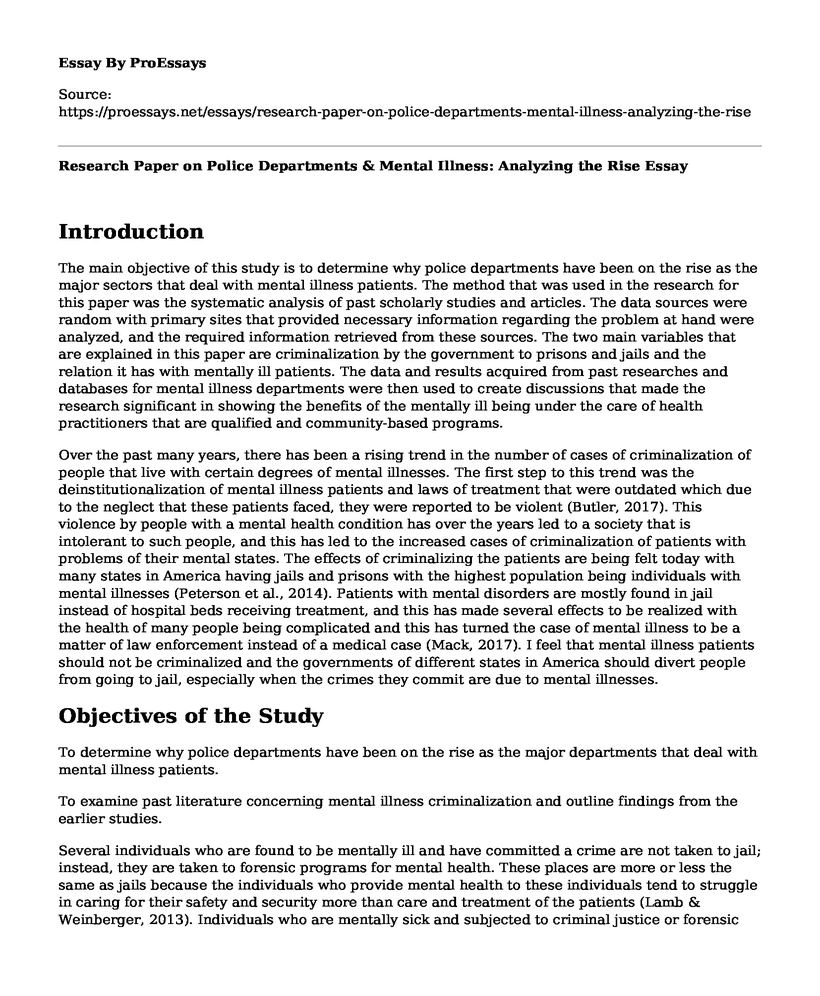Introduction
The main objective of this study is to determine why police departments have been on the rise as the major sectors that deal with mental illness patients. The method that was used in the research for this paper was the systematic analysis of past scholarly studies and articles. The data sources were random with primary sites that provided necessary information regarding the problem at hand were analyzed, and the required information retrieved from these sources. The two main variables that are explained in this paper are criminalization by the government to prisons and jails and the relation it has with mentally ill patients. The data and results acquired from past researches and databases for mental illness departments were then used to create discussions that made the research significant in showing the benefits of the mentally ill being under the care of health practitioners that are qualified and community-based programs.
Over the past many years, there has been a rising trend in the number of cases of criminalization of people that live with certain degrees of mental illnesses. The first step to this trend was the deinstitutionalization of mental illness patients and laws of treatment that were outdated which due to the neglect that these patients faced, they were reported to be violent (Butler, 2017). This violence by people with a mental health condition has over the years led to a society that is intolerant to such people, and this has led to the increased cases of criminalization of patients with problems of their mental states. The effects of criminalizing the patients are being felt today with many states in America having jails and prisons with the highest population being individuals with mental illnesses (Peterson et al., 2014). Patients with mental disorders are mostly found in jail instead of hospital beds receiving treatment, and this has made several effects to be realized with the health of many people being complicated and this has turned the case of mental illness to be a matter of law enforcement instead of a medical case (Mack, 2017). I feel that mental illness patients should not be criminalized and the governments of different states in America should divert people from going to jail, especially when the crimes they commit are due to mental illnesses.
Objectives of the Study
To determine why police departments have been on the rise as the major departments that deal with mental illness patients.
To examine past literature concerning mental illness criminalization and outline findings from the earlier studies.
Several individuals who are found to be mentally ill and have committed a crime are not taken to jail; instead, they are taken to forensic programs for mental health. These places are more or less the same as jails because the individuals who provide mental health to these individuals tend to struggle in caring for their safety and security more than care and treatment of the patients (Lamb & Weinberger, 2013). Individuals who are mentally sick and subjected to criminal justice or forensic programs deal with a lot of stigma throughout their lives. Such cases of stigma complicate the recovery of such patients and reintegration back to the community becomes hard. More education and research are essential in the dispelling of the myth that all mentally ill individuals in jails and forensic programs are heinous criminals and this will play a significant role in the smooth transition of these individuals back to the community (Horward, 2015). Mental illness does not have a direct relationship to criminal activities as is often portrayed and efforts to cut the number of patients with such disorders who are in jail should consider mental condition heterogeneity and the changing nature that associates it.
References
Butler, A. (2017). Mental Illness and the Criminal Justice System: A Review of Global Perspectives and Promising Practices. Retrieved from https://icclr.law.ubc.ca/wp-content/uploads/2017/06/Mental-Illness-and-the-Criminal-Justice-System_Butler_ICCLR_0.pdf
Howard, J. (2015). Unlocking Change: Decriminalizing Mental Health Issues In Ontario. Retrieved from http://www.johnhoward.on.ca/wp-content/uploads/2015/07/Unlocking-Change-Final-August-2015.pdf
Lamb, H. R., & Weinberger, L. E. (2013). Some perspectives on criminalization. Journal of the American Academy of Psychiatry and the Law Online, 41(2), 287-293.
Mack, M. (2017). Decriminalization of Mental Illness: Fixing a Broken System. Retrieved from https://cosca.ncsc.org/~/media/Microsites/Files/COSCA/Policy%20Papers/2016-2017-Decriminalization-of-Mental-Illness-Fixing-a-Broken-System.ashx
Peterson, J., Skeem, J., Kennealy, P., Bray, B., & Zvonkovic, A. (2014). How Often and How Consistently do Symptoms Directly Precede Criminal Behavior Among Offenders With Mental Illness?. Retrieved from https://www.apa.org/pubs/journals/releases/lhb-0000075.pdf
Cite this page
Research Paper on Police Departments & Mental Illness: Analyzing the Rise. (2023, Jan 12). Retrieved from https://proessays.net/essays/research-paper-on-police-departments-mental-illness-analyzing-the-rise
If you are the original author of this essay and no longer wish to have it published on the ProEssays website, please click below to request its removal:
- Report Example on Darkness Visible: A Memoir of Madness
- The Morality of Suicide: The Divergent and Convergent Views
- The Central Beliefs, Customs, Traditions Practices and Contributors of Buddhism
- The Ministry of Transportation in Canada Paper Example
- Essay Sample on Beyond Blue
- Paper Example on Creativity in the Workplace: A Vital Aspect for Success
- Essay Sample on Coping with Crisis: Navigating Emotional Disorder & Disruption







